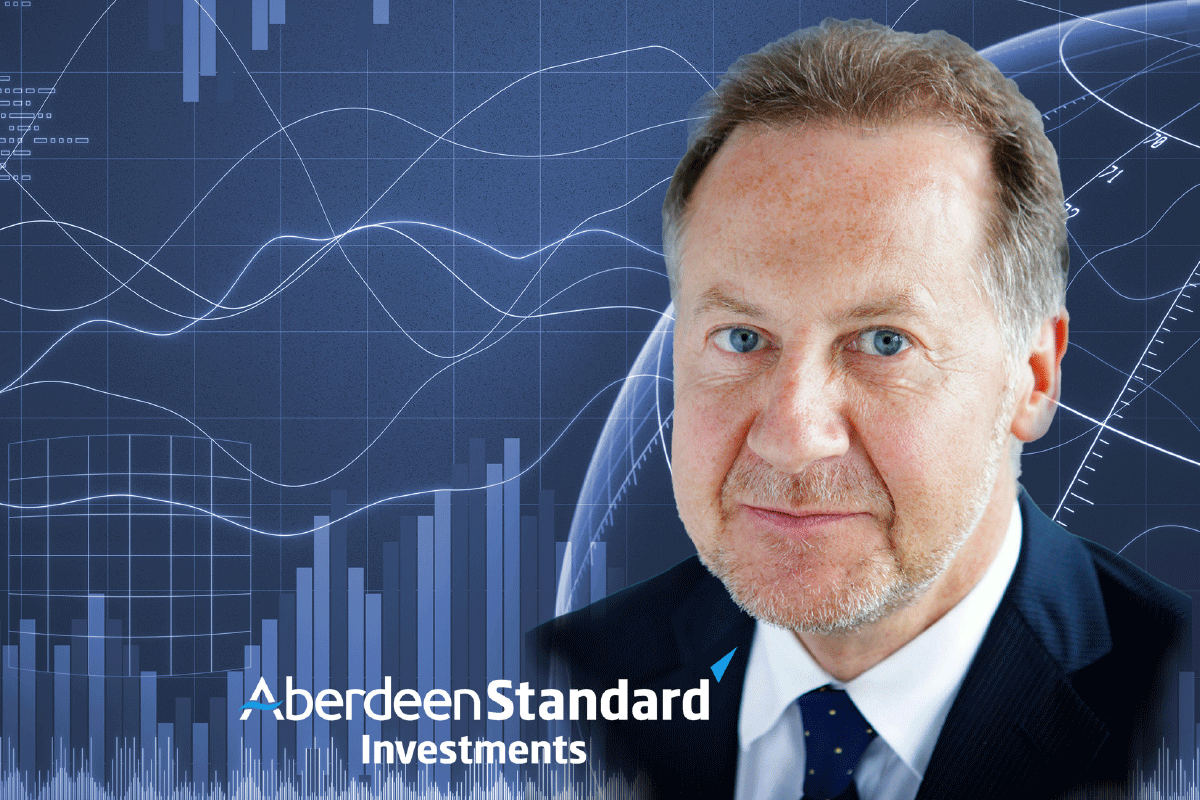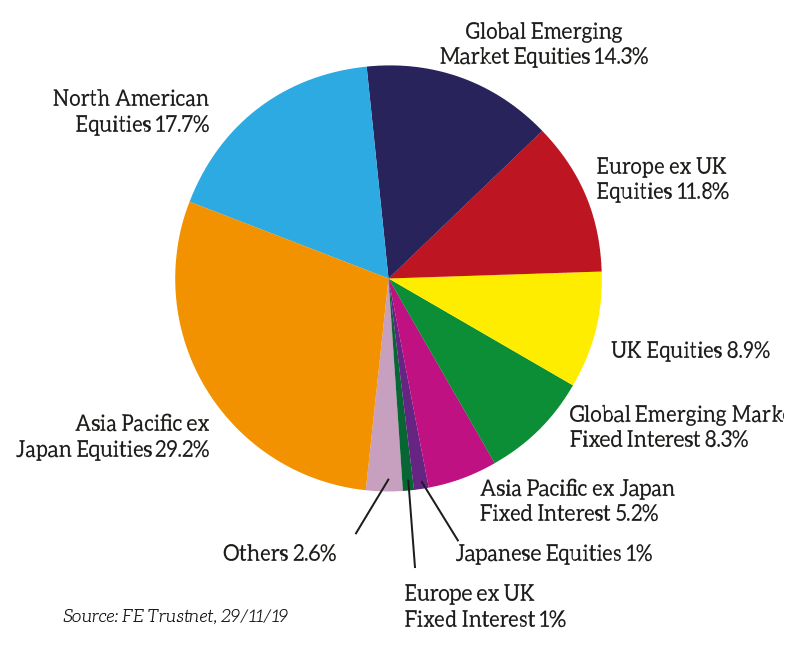Moneywise First 50 interview: Bruce Stout, Murray International Investment Trust
Bruce Stout, the manager of Murray International investment trust, talks to Edmund Greaves about the tru…
8th January 2020 14:54
by Edmund Greaves from interactive investor
Bruce Stout, the manager of Murray International investment trust, talks to Edmund Greaves about the trust’s objectives and his tips for beginner investors

What is Murray International Trust?
Murray International is an investment trust that has been around since 1907. It is a truly global trust that seeks to gain capital and income growth.
The trust is totally unconstrained in what it can invest in. We aim to deliver a dividend that is sustainable and grow it every year.
Why should people invest in your trust?
Twenty years ago, if you wanted above average yield and a dividend, you had to have a disproportionate amount of your money in the UK. Even though it was called Murray International, 20 years ago the trust had 45% in the UK.
Over the past 20 years, we have been able to fully diversify and become a much more global trust. And that is because we can achieve 4% yield and good dividend growth in Asia. We can get good dividend growth in European businesses, in Latin America, and even one or two in North America.
Global diversification matters too: it will give investors better returns with lower risk. In the past 35 years, out of the big six geographic investment regions (Asia, Europe, Japan, Latin America, UK, US), the UK has been the best performing region for just two years.
What gets you out of bed in the morning?
Every single day in investment is different. Over the short period of time that I have been involved, I have seen everything from the Berlin Wall coming down to stock-market crashes, to interest rates at 15% to negative bond yields.
Having studied economics, the most interesting thing is that all the relationships and parameters of economics have been stood on their head in my 35 years investing.
The Phillips curve [a theory that connects inflation with unemployment] does not work anymore. Investors buy bonds when they have got negative yields. Don’t ask me how to understand that because I can’t.
What’s the first thing you invested in?
On a personal basis, the first stock I invested in was GEC, where I was a graduate trainee. In 1985, GEC was the largest manufacturing company in the UK and employed 340,000 people. It was involved in telecommunications, power systems, jet electronics for aircraft – everything. Where is it now? It is bust.
Why is it bust? Because it was mismanaged dreadfully in the late 1990s during the tech boom. The company always had a strong balance sheet, lots of cash, but it was spending money on businesses in America and it did not know what it was buying.
The big lesson about this is that nothing, no business, anywhere, is too big to fail. I had buttons in it, because I was just a graduate trainee who put some salary every month into a savings scheme. But there were many people I know 10 years after I left who still did that.
A large proportion of their personal wealth was in GEC stocks because they had saved and saved into the scheme. When the company went bust, they lost the lot because they had no diversification. They were investing in something that they worked for and they just thought it was a good company, but every company can go down.
What have been your best and worst investment decisions for the trust?
Anything you do in life needs a bit of luck. Before the financial crisis we were very concerned about stock market valuations, so we sold a lot and bought bonds which were showing, for example, a 5.5% yield on a 10-year gilt. We didn’t see the global financial crisis coming, but we did make the right decision at the right time to protect our capital.
I think the worst decision is when you invest in a company that goes wrong, but you don’t cut it. You don’t accept the fact that it is not evolving according to the investment case.
What one tip would you give to a beginner investor?
Try to know what you are investing in. Look for transparency.
If you are investing in a trust, then look at what is in the trust, get the publication on the monthly basis of the portfolio. If it says it does something, make sure that does do that. It could be geography, timescale, income or capital – you cannot make that decision without information.
What you cannot do is just invest in something because it is a ‘blue chip’ or has a reputation. How many blue-chip companies in the UK have gone? ICI was a blue chip. GEC was a blue chip. Marks & Spencer is a blue chip. Two of them are gone and one is really struggling. You have to be informed. Don’t take anything at face value.
Murray International Trust
Launch: 18/12/1907
Fund size: £1,512.99 million
Charge (OCF): 0.5%
Yield: 4.23%
Source: FE Trustnet, 11/11/19
The manager behind the fund
Bruce Stout is a senior investment manager on the global equities team at Aberdeen Standard Investments. Bruce joined Aberdeen in 1987 via the acquisition of Murray Johnstone.
Bruce graduated with a BA in Economics from the University of Strathclyde and completed a graduate training course with General Electric Company UK.
Regional breakdown

Discrete performance of the fund over five years (%)
Period | 0-12 m | 12-24 m | 24-36 m | 36-48 m | 48-60 m |
Murray International Trust | 16.7 | -10 | 17.1 | 41.3 | -18.9 |
IT Global Equity Income | 15.9 | -3.6 | 21.6 | 20.2 | 1.4 |
NAV | 9.1 | -5.1 | 16.6 | 35.6 | -11.7 |
Source: FE Trustnet, 29/11/19
Top 10 holdings
# | Holding | |
1 | OVERSEA-CHINESE BANKING CORP | 2.2% |
2 | TOTAL SA | 2.4% |
3 | UNILEVER INDONESIA | 2.5% |
4 | PHILIP MORRIS INTERNATIONAL INC | 2.6% |
5 | VERIZON COMMUNICATIONS INC | 2.7% |
6 | ROCHE HLDG AG | 2.7% |
7 | CME GROUP INC | 3.2% |
8 | TAIWAN MOBILE CO | 3.4% |
9 | GRUPO AEROPORTUARIO DEL PACIFICO SA | 4.1% |
10 | TAIWAN SEMI-CONDUCTOR CO | 5.3% |
Source: FE Trustnet, 29/11/19
This article was originally published in our sister magazine Moneywise, which ceased publication in August 2020.
These articles are provided for information purposes only. Occasionally, an opinion about whether to buy or sell a specific investment may be provided by third parties. The content is not intended to be a personal recommendation to buy or sell any financial instrument or product, or to adopt any investment strategy as it is not provided based on an assessment of your investing knowledge and experience, your financial situation or your investment objectives. The value of your investments, and the income derived from them, may go down as well as up. You may not get back all the money that you invest. The investments referred to in this article may not be suitable for all investors, and if in doubt, an investor should seek advice from a qualified investment adviser.
Full performance can be found on the company or index summary page on the interactive investor website. Simply click on the company's or index name highlighted in the article.